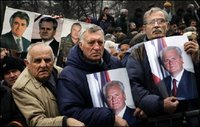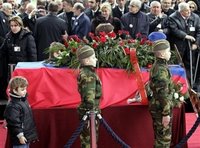Defiant Serbs Bid Farewell to Milosevic
 POZAREVAC, Serbia and Montenegro — Former Yugoslav President Slobodan Milosevic was buried Saturday in his hometown on a day that had the air of a political rally, with fervent crowds chanting his nickname, "Slobo," as if he were still their leader.
POZAREVAC, Serbia and Montenegro — Former Yugoslav President Slobodan Milosevic was buried Saturday in his hometown on a day that had the air of a political rally, with fervent crowds chanting his nickname, "Slobo," as if he were still their leader.Although more than 60,000 defiant supporters had gathered in the capital, Belgrade, earlier in the day to commemorate the former president, the burial service here in a small Serbian town smelling of damp and wood smoke was low-key and oddly devoid of emotion.

Neither Milosevic's widow, Mirjana Markovic, nor his children, Marko and Marija, attended the funeral, which was televised on a single Serbian network. Markovic and her son live in exile in Moscow, and she faces corruption charges in Serbia.
Despite expectations that a Serbian Orthodox bishop would preside, the former leader was buried after dark without a religious service under a linden tree in the garden of the house he owned here.
After letters from his widow and son were read, leaders of the Socialist Party kissed the simple wooden grave marker, followed by two boys and a girl dressed in camouflage uniforms.
The burial came a week after Milosevic died in a United Nations detention facility in The Hague where he was on trial on genocide and war crimes charges. During the 1990s, he led his country into nationalist wars in Bosnia-Herzegovina, Croatia and Serbia's Kosovo province that left more than 225,000 people dead.
Conversations with Milosevic supporters and critics over the last several days suggest that his legacy here will be one of widespread distrust of and alienation from the West. Regardless of whether Serbs loved or hated him — and it was often one or the other — they share a sense that this part of the world has been unjustly treated and almost always misunderstood.
"The most lasting legacy for Serbia is how he divided Serbia from the rest of the world," said Ljiljana Smajlovic, the editor in chief of Politika, one of Serbia's largest daily newspapers. "In The Hague, Milosevic was representing a catalog of Serbian grievances, and people listened to that."
Milosevic died a far more popular man than he was when he was deposed Oct. 5, 2000. The five years he spent in The Hague burnished his image as television beamed him, facing down lawyers and judges in a foreign court, into Serbian homes.
The crowds that turned out in front of the Serbian parliament in Belgrade on Saturday to mourn Milosevic included the young and old, rich and poor. They came because more popular and enduring than Milosevic were his anti-Western ideas, which Serbs feel as keenly as ever today.
The Hague tribunal was already a hated institution in Serbia, seen as favoring ethnic Albanians and Bosnian Muslims — it recently allowed a Kosovo Albanian indicted on charges of crimes against humanity to participate in politics in the majority ethnic Albanian province.
Unexplained circumstances of Milosevic's death have exacerbated the image of Westerners as agents of evil. The former Yugoslav president died of a heart attack, but a recent blood test found a drug in his system that undermines the effect of the heart medicine he was taking. The tribunal has not been able to explain the presence of the drug, and many in Serbia believe it was given to him to kill him.
The International Crisis Group, a Washington- and Brussels-based think tank, counts 71% of Serbian lawmakers as holding anti-Western views.
"The majority of Serbs agreed with Milosevic's reading of history, and the government did nothing to undo the Milosevic propaganda…. They continued to strengthen the myths and lies and they are now even stronger because they are being repeated by democrats," said James Lyon, the director of the crisis group's Belgrade office. He noted that the Belgrade rally, which was organized by ultranationalists and the Socialist Party that Milosevic once led, had the tacit approval of the government of Serbian Prime Minister Vojislav Kostunica.
The government did refuse to hold a state funeral for Milosevic or bury him in a place of honor in the Belgrade cemetery, suggesting a considerable difference of opinion in official circles about how to treat the former leader.
For many Serbs it was difficult to avoid making comparisons between Milosevic's funeral and that of Josip Broz Tito, who ruled Yugoslavia for 35 years after World War II.
Tito's funeral was an international event, a historic moment felt not just in Serbia, said Zoran Panovic, a columnist at Danas, a liberal Serbian daily, who has studied funerals.
"There will be a very small and modest international presence at Milosevic's funeral," said Panovic, speaking before the funeral. "This is very important at these types of events in Serbia. Tito's funeral had so many statesmen — it had the most until the funeral of Yitzhak Rabin," the Israeli prime minister assassinated in 1995.
The mood at the rally in Belgrade was sober but angry. Some people refused to talk to Western journalists, waving them away.
Milosevic associate Bogoljub Bjelica read a speech that the former leader had given while in power, to cheers of affirmation from the crowd filling the square, many of whom wore Milosevic buttons or ones bearing the face of Vojislav Seselj, the leader of the Radical Party, who has also been indicted on war crimes charges.
"The future of Serbia is to be exterminated. This is the master plan. They do not want peace in the Balkans — they want this to be a zone of constant fighting [run] by a puppet government … and a big task of every puppet government is to quickly divide a people from its past, to reduce its national symbols, even its language; to reduce its identity to a couple of national dishes and a couple of national heroes."
A woman in a snow-white jacket nodded vigorously as he spoke. "Milosevic was an ideal Serbian; we have been sold," said Milena Nestorovic, 35, of the town of Kraljevo. "We would like you to feel everything that we felt in Bosnia and Kosovo…. We want you to feel a loss like our loss of Milosevic. I hope you will lose an ideal, but Serbia will never come to its knees."
Several people at the rally said the large number in attendance was a good sign for Serbia and for all that Milosevic stood for. "I am here today to see with my own eyes how many people came to say goodbye because all these leaders and foreign journalists say one thing, but you should know that each person had two or three people at home watching TV, who could not come but wanted to today," said Ljiljana Miljkovic, 65, a retired nurse.
The second ceremony of the day took place in Milosevic's hometown on an alluvial plain between the Danube and the Morava rivers. Nearby is a U.S. Steel Serbia factory that belches fumes into the air.
Rain began to fall as thousands of supporters lined the main streets. People threw red roses and red carnations at his hearse, and a small brass band played a funeral march.
Many supporters had come in buses, but many also were locals who felt a need both to defend and explain Milosevic and the Serbs.
"We were represented as monsters in the international community," said Dragana Ocokoljic, 43, an official at the local prison and a member of the municipal council. "We are a civilized people. I have read 3,000 books.
"The West said they would help us when they brought down Milosevic, but in fact everything was even worse…. Now Serbia is waking up, and this funeral is part of that."
leave a response